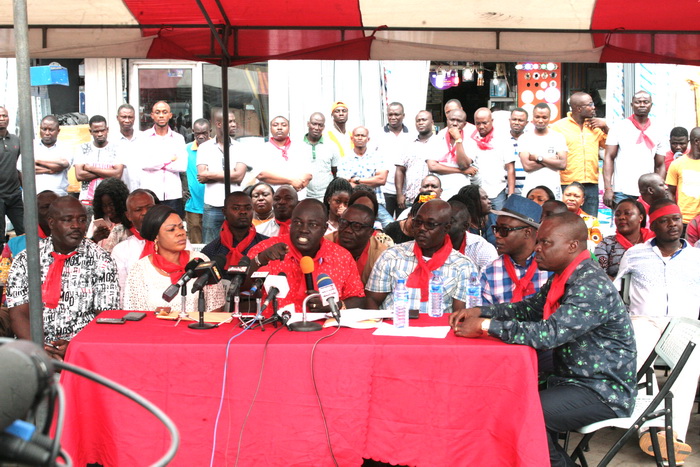
GUTA threatens not to pay taxes over invasion of foreign retailers
The Ghana Union of Traders Association (GUTA) has threatened to stop payment of taxes if the law banning foreigners from participating in retail business is not enforced by the end of October this year.
According to the association, foreigners have taken up spaces meant for citizens in markets and are engaging in money laundering activities.
In addition, the association has urged the government to revise its strategies and reduce significantly the benchmark values placed on imports.
The Greater Accra Regional GUTA General Secretary, Nana Opoku, was speaking at a press conference in Accra on Tuesday.
Payment of taxes
“If the foreigners are not stopped, we will be compelled as a union to stop filing VAT returns and other tax obligations. The same tax laws that mandate us to fulfil our tax obligations must compel the state security agencies to enforce the GIPC law,” Nana Opoku said.
He claimed that the foreign nationals operating in the retail sector did not pay VAT and related taxes to the Ghana Revenue Authority (GRA).
GIPC Act
According to Nana Opoku, the Ghana Investment Promotion Centre (GIPC) Act 865, debars foreigners from operating in the country’s retail business.
Section 27 sub section (1a) of the Act, states that, “A person who is not a citizen or an enterprise which is not wholly owned by a citizen shall not invest or participate in sale of goods or provision of services in a market, petty trading or hawking or selling of goods in a stall at any place.”
The association has been protesting the participation of foreigners in retail business in the country for some time now as it contravens the GIPC law .
Even though the Ministry of Trade and Industry and the GIPC made previous interventions to solve the problem, the GUTA believes efforts by the authorities and enforcement agencies are not far reaching enough to address the issue.
According to Nana Opoku, members of the GUTA who are law-abiding citizens are asking law enforcement agencies and the authorities to ensure that, all foreigners operating illegally in the sector leave the markets by the end of October this year.
Money laundering
Nana Opoku further alleged that foreign nationals in the retail trade were laundering money in connivance with some businessmen and women to transfer money from recognisable banks in the country to their counterparts outside.
“The ripple effects of such lawlessness on the part of these foreigners is what has led to the collapse of some banks in the country and unstable foreign exchange transactions,” he claimed.
Besides, he said, the foreign nationals were also faking indigenous registered products and selling them cheap on the market. Meanwhile, he said, the foreigners offered employment to their compatriots rather than to Ghanaian nationals.
According to him, the entry of foreigners into the Ghanaian retail market has also led to high cost in shop rentals in various markets across in the country.
Benchmark values
Touching on the benchmark values on imports, the general secretary said although members of the association supported the paperless clearing system, the updated benchmark values on imports had gone up by about 300 per cent.
“Values have gone up by more than 300 per cent on average and this clearly has a devastating effect on our business and we think that the government’s efforts at curbing prices may not be achieved,” he stated.
For instance, he said, under the new benchmark which took effect from July 26, 2017, shoes were calculated in pairs instead of the initial benchmark measurement which was done in dozens.
Additionally, he mentioned, while electrical cables were measured in coils, they were now measured in metres; frozen foods were measured in cartoons but now measured per kilos and ceramic tiles which used to be measured per box were now measured per square metre.
The Chairman of the GUTA, Mr David Amoateng, said this had led to some indigenes to lose their shops to foreigners.
He, therefore, cautioned landlords who were engaged in such practices to desist from it, since aiding, abetting and fronting for foreign nationals was a crime.
